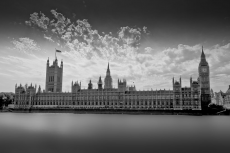
Incredibly, during this time the state of Britain shrank “even as it addressed the problems of a rapidly industrialising society”. They managed this feat partly, the two authors claim, because of the Victorian crackdown on “Old Corruption” (essentially, people in high places receiving money in various forms and under various pretences from the state), meaning that the state was no longer wasting precious money on people who really didn’t need it. As a result of various cost-cutting measures and the drive for a more efficient state, “Gross income from all forms of taxation fell from under £80 million in 1816 to well under £60 million in 1846 despite a nearly 50 percent increase in the size of the population.” The Victorian times were a victory for the liberal, leaner vision of the state. Some Victorian liberals even believed that “lean-government liberalism” was the end of progress, thinking it was the pinnacle of human civilization and could not be improved upon.
However, towards the end of his life John Stuart Mill, started to have doubts that the only job the state should perform, besides maintaining law and order, was to ensure economic and individual liberty. He began to see the flaws in his father James Mill’s laissez-faire attitude, (that the state should intervene in the economy as little as possible) realising that equality of opportunity and meritocracy did not really exist if certain people were born with particular economic and societal privileges while others were not. Or as Micklethwait and Wooldridge put it, “How could you judge each individual on his merits when dunces went to Eton [the most prestigious, well-renowned school in the country] and geniuses were sent up chimneys?” It was clear that the play field needed levelling out and that people from poorer backgrounds needed support in order to realise their full potential as those in the upper classes could.
As a result, Mill started to support the idea of a bigger state and more state intervention. His later editions of his classic work Principals of Economy, initially a work which stood for classical economic liberalism and individualism became an appraisal for “collectivism” – placing more of an emphasis on people working together and acting for the good of the community. And again, much of late Victorian society appeared to be on the same page. Many began to launch attacks on the elitism of places such as the University of Oxford and Cambridge, as well as of public schools such as Eton. Influential intellectuals, such as Matthew Arnold, William Foster and Robert Lowe “wanted to build a system of elementary schools that would ensure that everybody had access to basic education” and expressed the desire to “construct a ladder of opportunity that would take exceptional talent from the most humble schools to the most exalted professions.” In light of the focus upon economic justice and social reform by intellectuals, politicians, clergymen, novelists, such as Charles Dickens, and movements, such as the Chartists and the Levellers, the liberal state started to expand.
Image: By Mdbeckwith (Own work) [CC BY 3.0 (http://creativecommons.org/licenses/by/3.0)], via Wikimedia Commons

0 Comment:
Be the first one to comment on this article.